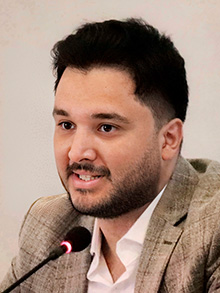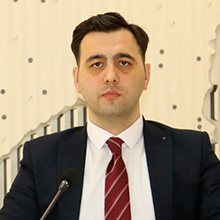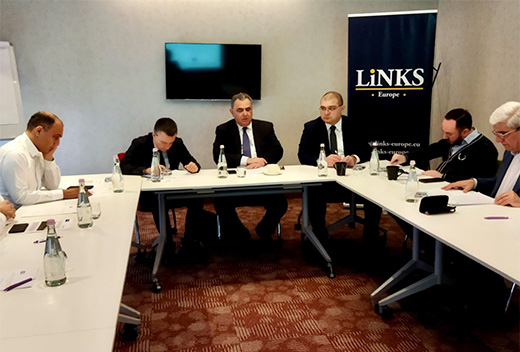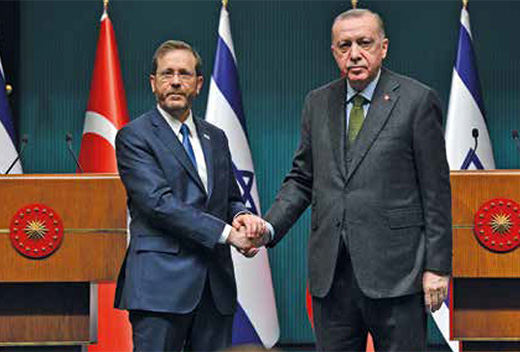How will the destruction of NKR impact the Armenia-Azerbaijan peace process?[Over]  By Benyamin POGHOSYAN, PhD, Chairman, Center for Political and Economic Strategic Studies By Benyamin POGHOSYAN, PhD, Chairman, Center for Political and Economic Strategic Studies
Azerbaijan's destruction by force of the self-declared Nagorno Karabakh Republic (NKR) is seen by some as removing one of the key obstacles in the negotiations between Armenia and Azerbaijan, that will resume in the next days in Granada, Spain. Others however see the elimination of the Karabakh factor as opening the way for Azerbaijan to make even more demands on Armenia. It is challenging to assess whether peace between Armenia and Azerbaijan is within reach. However, one thing is clear: the second humiliation of Armenia within three years has already triggered significant backlash among Armenians. Many are still in shock, which is why Yerevan witnessed only small protests recently. However, many Armenians are fed up with permanent losses, and there is a growing feeling that Armenia, in the long–term perspective, should become stronger to reclaim its position in the region. In the current environment, any attack of Azerbaijan against Armenia, regardless of pretexts or reasons, will only strengthen this feeling among Armenians and will be a direct path to long-term instability and conflicts in the South Caucasus.
READ MORE
The Place of Uyghur and Kurdish Issues in Sino-Turkish Relations[Over]  By Vusal GULIYEV, Visiting Research Fellow at the Asian Studies Center of Boğaziçi University By Vusal GULIYEV, Visiting Research Fellow at the Asian Studies Center of Boğaziçi University
In late December 2022, Türkiye’s Foreign Minister Mevlüt Çavuşoğlu, raised the Uyghur issue at an end-of-the-year press briefing by questioning whether Xi Jinping’s government had failed to keep a promise made five years ago. The Uyghur issue concerns events that began in 2017, in which the accusations against the Chinese government’s crackdown on thousands of Uyghurs in detention camps under the guise of an anti-terrorist operation has started. The promise of which Çavuşoğlu spoke was an unfettered visit by a Turkish to the Xinjiang Uyghur Autonomous Region (XUAR). However, that promise has not been kept because of the myriad of requirements placed on the visit by China, such as predetermining the places to be visited.
READ MORE
- September 15, 2023 06:59AM
The South Caucasus and Iran’s SCO Membership[Over]  By Benyamin POGHOSYAN, PhD, Chairman, Center for Political and Economic Strategic Studies By Benyamin POGHOSYAN, PhD, Chairman, Center for Political and Economic Strategic Studies
As the Russia – West confrontation continues without any signs of an end, many experts, academicians, and politicians seek to grasp the contours of the emerging new world order. Some believe that, in the end, a new bipolar world will emerge dominated by China and the US, while Russia will be forced to choose between these states based on the outcome of the Russia – Ukraine war. If the West can impose a strategic defeat on Russia and bring about a regime change, Russia will be in the West’s camp against China. Otherwise, the Kremlin will be a junior partner of China, supplying Beijing with cheap raw materials and getting access to Chinese funds and technologies. Others argue that the future world order will be multipolar, with no fixed alliances, and several key players will pursue temporary cooperation with each other based on short-term needs. One thing is clear: the finalization of the new world order will take years and decades, and till then, instability and strategic ambiguity will be the primary features of the world.
READ MORE
Geopolitical Choices of Armenia amidst the Transformation of Post-Cold War Global Order[Over]  By Benyamin POGHOSYAN, PhD, Chairman, Center for Political and Economic Strategic Studies By Benyamin POGHOSYAN, PhD, Chairman, Center for Political and Economic Strategic Studies
The end of the Cold War and the collapse of the Soviet Union have ushered in hopes of humanity's happy and harmonious future. The ideas such as "End of history" (Fukuyama, 1992) became very popular both within academic circles and policymakers. There was a widespread belief that the entire planet would live under liberal democracy, and interstate conflicts will become bad memories from history. The last decade of the 20thcentury seemed to confirm those hopes. The EU and NATO enlargement, market reforms informer socialist states, cooperative relations between Russia and the West, and the growing US –China economic cooperation have seemingly justified hopes for establishing the world united under the banner of liberal democracy. READ MORE
Prospects for Armenia-Turkey Normalization[Over]  By Benyamin POGHOSYAN, PhD, Chairman, Center for Political and Economic Strategic Studies By Benyamin POGHOSYAN, PhD, Chairman, Center for Political and Economic Strategic Studies
The devastating earthquake in Turkey, and Armenia's decision to provide humanitarian assistance and send rescue teams, have however opened a new window of opportunity for revitalizing the stalled [normalization] process". "Turkey assessed the Armenian government's gesture positively, and the Armenian foreign minister's visit to Turkey made it possible to advance the implementation of agreements reached in 2022. And yet, "earthquake diplomacy" will not lead to short-term breakthroughs in bilateral relations.
Devastating earthquakes of 7.8 and 7.5 magnitudes struck southern Turkey on 6 February 2023. By 10 April, the death toll had passed 50,000, while the number of wounded passed 100,000. More than 12,000 buildings were destroyed, and large-scale rescue operations were underway. Besides the immense human tragedy, the earthquake had domestic and foreign policy implications for Turkey. The country faces crucial presidential and parliamentary elections scheduled for 14 May. READ MORE
The Transformation of the World Order[Over]  By Benyamin POGHOSYAN, PhD, Chairman, Center for Political and Economic Strategic Studies By Benyamin POGHOSYAN, PhD, Chairman, Center for Political and Economic Strategic Studies
The 2007-2008 world financial crisis triggered discussions about the inevitable decline of the post-Cold War unipolar order, marked by absolute US hegemony. The Arab Spring, the 2014 Ukraine crisis, the Syrian civil war, and the botched US withdrawal from Afghanistan in 2021 contributed to the ongoing debate about the relative decline of the US and the rise of other powers. The growing influence of non-Western institutions, such as the association of Brazil, Russia, India, China and South Africa (BRICS) and the Shanghai Cooperation Organization (SCO), attempts to abandon the US dollar in bilateral trade, and the establishment of alternative international financial institutions, such as the New Development Bank of BRICS and the Asian Infrastructure Investment Bank, seemed to shatter the undisputed leadership of Western political and financial institutions and the role of the US dollar as the only global reserve currency. The growing economic and military strength of China, the more assertive foreign policy of Russia, and India’s balanced foreign policy seeking to pursue cooperative relations with the West and Russia were signs of the changing nature of international relations. READ MORE
From Syria to Nagorno-Karabakh: Assessing Russo-Turkish ‘Co-opetition’[Over]  By Yeghia TASHJIAN, Beirut-based regional analyst and researcher, columnist, "The Armenian Weekly” By Yeghia TASHJIAN, Beirut-based regional analyst and researcher, columnist, "The Armenian Weekly”
On a diplomatic level, Turkey tried to launch “Astana style” diplomatic measures to address Nagorno-Karabakh. However, given the fact that the conflict was taking place in the post-Soviet space, Russia failed to see much incentive in engaging in a bilateral track with Turkey in the form of a new “Astana style” process where Turkey and Russia were going to be equal partners, addressing a conflict in Russia’s “backyard”.
The year 2022 witnessed intensified dialogues between top Syrian and Turkish officials. These kicked off with an August meeting in Damascus between Ali Mamlouk, the Head of the National Security Bureau of the Ba’ath Party and a Special Security Advisor to Syrian President Bashar al-Assad, and Hakan Fidan, the Head of Turkiye’s National Intelligence Organization (MIT). They concluded with a tripartite December meeting in Moscow, where Russian Defence Minister Sergei Shoigu hosted his Syrian and Turkish colleagues Ali Mahmoud Abbas and Hulusi Akar (remarkably, Ali Mamlouk and Hakan Fidan were also present). Those meetings prompted world media and political experts to speculate about an “unthinkable” Syrian-Turkish rapprochement becoming “thinkable”.
READ MORE
Will the Earthquake Threaten Erdogan’s Rule?[Over]  By Yeghia TASHJIAN, Beirut-based regional analyst and researcher, columnist, "The Armenian Weekly” By Yeghia TASHJIAN, Beirut-based regional analyst and researcher, columnist, "The Armenian Weekly”
On February 6, 2023, two earthquakes with magnitudes 7.8 and 7.5—the deadliest in Turkey’s history—hit the Syrian-Turkish border. At least 45,000 people died in Turkey. Another 6,000 lives were lost in Syria. The fallout of the catastrophic earthquake came as President Erdogan faces his toughest re-election campaign yet. Despite speculation that Erdogan may postpone the elections, he declared that presidential and parliamentary elections will be held on the agreed-upon date, May 14 of this year.
Turkey is a central power in the Middle East. After the 2020 war in Nagorno-Karabakh, its influence increased in the South Caucasus. Thus, any political shift will have an impact on the political landscape of the region. The Turkish President is known for exploiting crises; how he will be able to manage this current crisis and use it to his advantage is still questionable. This article will analyse the impact of the earthquake on Turkey’s domestic politics amid the upcoming presidential and parliamentary elections as Turkey prepares to celebrate the centennial of its foundation as a republic in October 2023.
READ MORE
Turkey’s Regional Policy and the Prospects of Armenia-Turkey Normalization[Over]  By Benyamin POGHOSYAN, PhD, Chairman, Center for Political and Economic Strategic Studies By Benyamin POGHOSYAN, PhD, Chairman, Center for Political and Economic Strategic Studies
On October 6, Armenian Prime Minister Nikol Pashinyan met with Turkish President Recep Tayyip Erdoğan in Prague on the sidelines of the European Political Community summit. This was the first meeting between Armenian and Turkish leaders since the failure of “football diplomacy” in 2008-2009. This meeting may play a positive role in fostering Armenia-Turkey normalization. Meanwhile, Armenia needs a better understanding of Turkey’s regional strategy in the South Caucasus and of the role that Turkey attaches to its relations with Armenia in that framework.
Since the collapse of the Soviet Union, Turkey’s strategic goal in the South Caucasus has been to dominate the region. Turkish regional dominance is only possible at the expense of Russia’s leading position, which puts Turkey and Russia at strategic loggerheads in the region. Neither the recent warming of relations between Ankara and Moscow, nor initiatives like the establishment of the Astana format for Syria or the 3+2 format for the South Caucasus, have changed the fundamental parameters of the Russia-Turkey rivalry in the South Caucasus. READ MORE
Turkey Imposes Obstacles to Nordic Countries’ NATO Aspirations[Over]  By Eugene KOGAN, Tbilisi-based defence and security expert By Eugene KOGAN, Tbilisi-based defence and security expert
Sweden and Finland have long followed a policy of military neutrality so as not to incur Russia’s wrath. However, the unprovoked Russian war against Ukraine has changed the attitude of these countries. Both Sweden and Finland announced their wish to join the North Atlantic Alliance in mid-May. Then, out of the blue, came obstruction from Turkey with the claim that both countries were financing terror and supporting Kurdish “terrorist” groups that Turkey has been trying to eliminate for the last 40 years or so. One of the major handicaps of the North Atlantic Treaty was and still is the omission of information about a NATO country blocking the participation of non-NATO states in NATO activities or the joining of new NATO members into the Alliance. Admission of new NATO members requires the unanimous consent of all members and the subsequent ratification of protocols by their respective parliaments. READ MORE.
Central Asians Are Expanding Strategic Relations with Azerbaijan[Over]  By Ayaz MUSEYIBOV, Adjunct lecturer at Azerbaijan Technical University
By Ayaz MUSEYIBOV, Adjunct lecturer at Azerbaijan Technical University
In the wake of the recent global geopolitical challenges including the war in Europe, instability in Afghanistan, and many other rapid global changes, Central Asian countries diversify and expand their economic, strategic, and political relations. As Azerbaijan is emerging as a new energy and logistic hub in Euro-Asian value chains, economic relations with Azerbaijan are crucial in regional logistics and energy spheres. Therefore, on April 20th and June 21st, 2022, Kyrgyzstan and Uzbekistan signed the declarations of strategic partnerships with Azerbaijan, respectively. Thereafter, Kazakhstan and Turkmenistan signed cooperation documents with Azerbaijan covering various directions. READ MORE
Armenia–India Relations: From Politics to Arms Trade[Over]  By Yeghia TASHJIAN, Beirut-based regional analyst and researcher, columnist, "The Armenian Weekly” By Yeghia TASHJIAN, Beirut-based regional analyst and researcher, columnist, "The Armenian Weekly”
During my academic visit to New Delhi in February 2020, I met with Indian politicians and scholars and discussed opportunities for upgrading Armenian-Indian relations. While back then the idea of arms trade was still immature, I raised the issue of defence cooperation between the two countries. Through honest discussions about the Armenian cause, I came to a conclusion, which I summarized in a November 2020 article for the Armenian Weekly. Despite today’s tumultuous climate in Armenia, it’s reassuring to learn that this 2020 recommendation has materialized, and bilateral ties are taking military and strategic dimensions. READ MORE
Russia’s Need to Circumvent Sanctions Gives New Life to North-South Project[Over]
 By Fuad SHAHBAZOV, Baku-based independent regional security and defence analyst By Fuad SHAHBAZOV, Baku-based independent regional security and defence analyst
With the unprovoked military intervention in Ukraine, Russia has been isolated economically and politically due to the Western-imposed sanctions. But while the sanctions banned Russia from trading with the Western states, particularly in the energy field, some nations still prefer to maintain trade relations with Moscow. Countries like Iran, China and India are seeking to strengthen trade turnover by pushing the International North-South Transport Corridor (INSTC) project for a better connection via a multimodal transport network that spans rail, road, and sea. READ MORE
Beware of Americans Bearing Gifts[Over]  By Benyamin POGHOSYAN, PhD, Chairman, Center for Political and Economic Strategic Studies By Benyamin POGHOSYAN, PhD, Chairman, Center for Political and Economic Strategic Studies
The visit of Nancy Pelosi to Armenia created quite a lot of hype, since some saw in it the prospects for national salvation. But the visit's "democracy vs authoritarianism agenda" is risky for Armenia. Armenia should send clear signals to Russia and Iran that it has no intention to join the “democracy vs. authoritarianism fight” and will never allow anyone to use its territory for anti-Iranian or anti-Russian activities.
On September 17, 2022, Nancy Pelosi, the US House of Representatives speaker, arrived in Armenia for a three–day visit. She was the highest-ranking US official to visit Armenia since the country got its independence in 1991. The visit was agreed upon weeks, if not months in advance, but it took place only a few days after Azerbaijan had launched a new aggression against Armenia on September 13, 2022. The ceasefire was reached in late September 14 through the active mediation efforts of Russia, the US, and other external players. However, these hostilities overshadowed the visit. READ MORE
The South Caucasus from War to Peace: 30 Measures between Now and 2030[Over]  Joint Armenian-Azerbaijani Liaison Group on confidence-building measures Joint Armenian-Azerbaijani Liaison Group on confidence-building measures
The Joint Armenian-Azerbaijani Liaison Group on confidence-building measures in support of lasting peace in the South Caucasus has published its report in which it proposes 30 short, medium and long term measures in support of ongoing efforts to establish peace in the region. On Wednesday, 6 April, members of the Working Group, presented their report to the EU Special Representative for the South Caucasus, Toivo Klaar, and other EU officials at a special briefing in Brussels. In their report, published on the eve of the meeting between the leaders of Armenia and Azerbaijan and the president of the European Union in Brussels on 6 April, the group says that "all the ingredients for peace exist in the South Caucasus. All the ingredients for war exist too. What is in front of us is a choice". The group says that the proposed measures are a building block in the quest for peace but if the ideas being proposed are implemented the objective of building a peaceful, secure and prosperous South Caucasus will be much closer to being achieved. It was now necessary that all concerned should put effort into turning the thirty measures being proposed in the report into tangible action.
The work of the Joint Liaison Group was co-ordinated and facilitated by LINKS Europe - an independent foundation based in The Hague, The Netherlands - in the framework of the European Union's EU4Peace initiative. READ MORE
- September 27, 2022 08:43AM
Israeli-Turkish Relations: Challenges and Opportunities[Over]  By Eugene KOGAN, Tbilisi-based defence and security expert By Eugene KOGAN, Tbilisi-based defence and security expert
Even though Israel and Turkey normalised relations in June 2016 following the May 2010 Mavi Marmara Flotilla incident when Israeli soldiers killed ten people on board a Turkish vessel and the subsequent diplomatic rupture, Ankara’s support of the Hamas movement situated in the Gaza Strip continues to undermine bilateral relations.
The establishment of an official office in Istanbul in 2012 and its members are perceived as a thorn in the eye by the Israeli Government. Tel Aviv would like Erdoğan to close the Hamas office and expel its members from Turkey; however, this Israeli wish is not going to be granted any time soon since Erdoğan’s words do not translate into deeds. The signature of the Abraham Accords highlighted two divergent trends in the region: Turkey’s continued isolation and Israel’s strengthened position. This resulted in Erdoğan’s intention to improve relations with Israel. READ MORE.
- September 9, 2022 06:38AM
What Is Expected after the Erdogan-Putin Summit?[Over]  By Yeghia TASHJIAN, Beirut-based regional analyst and researcher, columnist, "The Armenian Weekly” By Yeghia TASHJIAN, Beirut-based regional analyst and researcher, columnist, "The Armenian Weekly”
On August 5, Turkish President Recep Tayyip Erdoğan and Russian President Vladimir Putin had a four-hour meeting in Russia to discuss bilateral ties and regional issues. The Sochi summit comes after Ankara scored a diplomatic victory by helping broker a grain deal between Turkey, Ukraine and Russia that has eased global food crisis fears and growing concerns of possible Turkish military escalation against the Kurds in Northern Syria. What implication will the summit have on the region? READ MORE
- September 9, 2022 06:34AM
Will Iran fight Azerbaijan if Baku seeks to invade Syunik?[Over]  By Benyamin POGHOSYAN, PhD, Chairman, Center for Political and Economic Strategic Studies By Benyamin POGHOSYAN, PhD, Chairman, Center for Political and Economic Strategic Studies
In the last 10 days, the most discussed issue amongst Armenian media, experts and political circles was the statement of Iran’s Supreme Leader during his meetings with the Russian and Turkish presidents held in Tehran. The presidents of Russia, Iran and Turkey gathered together to discuss the future of Syria in the Astana format amidst the ongoing war in Ukraine and complete rupture of Russia-West relations. Few could imagine that the Supreme Leader would mention Armenia and, in particular, the Armenia-Iran border during the summit. However, the Iranian message was clear: Iran will not tolerate the closure of the Armenia-Iran border. READ MORE
Will Azerbaijan become a NATO pawn against Russia in South Caucasus?[Over]  By Yeghia TASHJIAN, Beirut-based regional analyst and researcher, columnist, "The Armenian Weekly” By Yeghia TASHJIAN, Beirut-based regional analyst and researcher, columnist, "The Armenian Weekly”
Despite Azerbaijani President Ilham Aliyev’s adherence to the ideology of pan-Turkism, the former-Soviet republic has long managed to successfully balance its relations between Russia, Turkey, and the west. However, the ‘frozen conflict’ with Armenia over disputed Nagorno-Karabakh territory, and the on-going conflict in Ukraine, have recently tested the limits of this balancing act. In January 2022, as Russia’s military build-up on Ukraine’s border was in full swing, Aliyev visited his counterpart Volodymyr Zelensky in Kyiv and reaffirmed Baku’s support for Ukraine’s territorial integrity. Then, the following month – just two days before Russia announced its ‘special military operation’ in Ukraine – Aliyev was in Moscow signing a treaty of alliance with Russian President Vladimir Putin. READ MORE
Agreement on Nuclear Deal Increasingly Unlikely[Over]  By Benyamin POGHOSYAN, PhD, Chairman, Center for Political and Economic Strategic Studies By Benyamin POGHOSYAN, PhD, Chairman, Center for Political and Economic Strategic Studies
The election of Joe Biden as president in November 2020 raised hopes among the international community that the United States will restore the nuclear deal signed in 2015. Many architects of the deal returned to positions in the White House and State Department. The other signatories of the deal, including the three EU states, China and Russia, were ready to contribute to the restoration of the deal. Conventional wisdom said that Iran should be interested in restoring the deal, too. The economic downturn triggered by the re-imposition of the US sanctions created significant challenges for the Iranian government. READ MORE
Restoring Communication Links is an Important Confidence-building Measure[Over]  By Benyamin POGHOSYAN, PhD, Chairman, Center for Political and Economic Strategic Studies By Benyamin POGHOSYAN, PhD, Chairman, Center for Political and Economic Strategic Studies
There is broad consensus in the region and in the international community on the need to restore communications in the South Caucasus and on the possibility of finding mutually accepted solutions for this to be achieved. However the constant focus on the routes passing via the Syunik region and connecting Azerbaijan with Nakhijevan has made the whole process of restoration of communications a bone of contention for both sides. The restoration of communications may still play a positive role in the establishment of good neighbourly relations between Armenia and Azerbaijan, by creating conditions from which both societies can benefit. However, if the sides continue this tit-for-tat discussion around the "Zangezur corridor," blaming each other for violating previous agreements, the restoration of communications issue will only deepen the mistrust between them, he adds. Starting instead with a railway connection between Armenia and Nakhijevan via Yersakh on the other hand, requires only a further 1 km of railroad to be constructed, and will serve as a significant confidence-building measure between Armenia and Azerbaijan and will make it easier for Armenia and Azerbaijan to agree on the modalities for the restoration of other routes. READ MORE
How Azerbaijan Perceives the Russia-Ukraine Conflict[Over]  By Yeghia TASHJIAN, Beirut-based regional analyst and researcher, columnist, "The Armenian Weekly” By Yeghia TASHJIAN, Beirut-based regional analyst and researcher, columnist, "The Armenian Weekly”
As the “frozen conflict” with Armenia over Nagorno-Karabakh (Artsakh) persists, the Ukrainian crisis poses a different challenge for Azerbaijan. “Neutrality” appears to be the watchword as Baku seeks to preserve its ties with both Moscow and Kyiv. While Baku is concerned about the developing situation, it potentially stands to benefit from the trouble with its gas exports to Europe. Given Azerbaijan’s strategic partnership with Russia after the war on Nagorno-Karabakh and its friendly relations with Ukraine (not to mention its significant gas reserves), some may think that Baku is in a prime position to benefit from the looming energy crisis presented by the region’s unrest. READ MORE
Turkey’s Endgame in the Normalization Process with Armenia[Over]  By Benyamin POGHOSYAN, PhD, Chairman, Center for Political and Economic Strategic Studies By Benyamin POGHOSYAN, PhD, Chairman, Center for Political and Economic Strategic Studies
Armenia–Turkey normalization process was officially launched on January 14, 2022 when special representatives – the Deputy Speaker of the Armenian Parliament Ruben Rubinyan and Ambassador Serdar Kılıç – met in Moscow. The groundwork for this meeting began in mid-2021, when the Armenian government proposed the idea of peace in the South Caucasus and normalizing relations with Azerbaijan and Turkey. Armenia’s catastrophic defeat in the 2020 Karabakh war seemed to put aside one of the main obstacles to launching the Armenia–Turkey normalization process. The 2008-2009 “football diplomacy” failed mainly due to Turkey’s precondition to Armenia to return “occupied lands” to Azerbaijan. By signing the November 10, 2020 statement, the Armenian government accepted the loss of seven regions outside the former Nagorno Karabakh Autonomous Region (NKAR), as well as 30-percent of territories of NKAR itself. READ MORE
New Meeting between Pashinyan and Aliyev in Brussels: What next[Over]  By Benyamin POGHOSYAN, PhD, Chairman, Center for Political and Economic Strategic Studies By Benyamin POGHOSYAN, PhD, Chairman, Center for Political and Economic Strategic Studies
On April 6, 2022, Armenian Prime Minister Nikol Pashinyan and Azerbaijani President Ilham Aliyev held a meeting in Brussels mediated by the President of the European Council, Charles Michel. It was the second meeting in Brussels mediated by the European Union. The first took place in December 2021; on February 4, 2022, Armenian and Azerbaijan leaders held an online meeting with the participation of Michel and French President Emmanuel Macron. A week before the April 6 meeting, the EU hosted a meeting of high-level officials from Armenia and Azerbaijan in Brussels to advance joint efforts to find solutions to issues between both countries. The meeting between Secretary of the Security Council of Armenia Armen Grigoryan and assistant to the President of Azerbaijan Hikmet Hajiyev was facilitated by the EU Special Representative for the South Caucasus Toivo Klaar. As a result of the April 6 meeting, Pashinyan and Aliyev agreed to instruct their Ministers of Foreign Affairs to work on the preparation of a future peace treaty, which would address all necessary issues. READ MORE
Could Turkey-Russia Relations Sink over Ukraine?[Over]  By Yeghia TASHJIAN, Beirut-based regional analyst and researcher, columnist, "The Armenian Weekly” By Yeghia TASHJIAN, Beirut-based regional analyst and researcher, columnist, "The Armenian Weekly”
Neither friend nor foe, Turkey and Russia have backed opposing sides in several regional conflicts, yet managed to avoid direct confrontation. Now the Ukraine crisis poses a serious challenge.
The war in Ukraine has become the latest test for Turkey’s regional ambitions in confronting those of Russia, in what has clearly become a “cooperative rivalry.” This is where both sides, despite their opposite views on various regional conflicts ranging from Libya to Syria to the South Caucasus, have worked to manage these conflicts without directly challenging one another.
The current crisis has raised Turkey’s concerns of being in the firing line of Russia’s hegemonic ambitions. It is important to note that Turkey and Russia are not allies, but bitter ‘frenemies.’ Despite having robust commercial, energy, diplomatic and military ties, Turkey’s President Recep Tayyip Erdogan warned back in 2016 that NATO has to act and increase its presence in the Black Sea. READ MORE
|
|